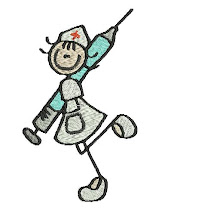I'm pretty sure I've hit a road block... Well maybe not a road block, but I was taking care of a patient tonight who's been on the unit for a solid 2 or 3 weeks now and really just had a difficult time. He was a younger man (maybe in his late 50's) who had suffered a serious bleed in his hypothalamus and has since been practically braindead and struggling to regulate temperature, etc. What's so deceiving about his current status is his ability to open his eyes and cough, which to the family (who is very religious and is keeping this gentleman alive incase of a 'miracle') means "Well if he can do this he must be getting better and anything is possible... " blah blah blah. I can appreciate their unrelenting sense of hope, but what I can't appreciate is their decision to keep him in the hospital bed for so long... alive. Now I know that last line may have been harsh and I apologize for being so crude, but it has frustrated me over the past few weeks to have to watch this father/brother/son/ husband waste away in a hospital bed while his family can not understand that this man is a living vegetable and no, he will not get better.
At first, I also almost had a difficult time believing that he would be like this forever. After it had sunk in though, I sat back for quite a few days wondering when it would click for the family like it had for me. I wanted to know when they were going to see past any potential for miracles and accept the reality of the situation. After a while they finally decided to make him a DNR, but for now he remains in our CCU bed waiting to be transfered to a near by rehab center/nursing home where he will go to die.
Tonight I really had such a tough time being with this patient. This man, since admission, has been bleeding from practically every available site, hes been seriously third spacing, he's developing cataracts... He's just a mess.
I think what I am struggling the most with about this situation is just the general well being of the patient. Granted I know that he's got very little brain function and he's been given ativan and what not, but it kills me to turn him and watch tears swell up in the corners of his eyes. Or even to stand next to him and watch him struggle for air while his lungs fill up with blood. I think lately we've been shipping so many success stories out that this particular case is difficult bc it breaks the current trend. I just keep putting myself in the shoes of his family members and can't get past how terrible it would be to watch a patient fade away in such a miserable fashion. This is no wearing out process, this man is straight deteriorating in to nothing and it's heartbreaking to watch. I can't understand how people can keep their love one's alive like that, I really can't.
I had mentioned to a nurse my feeling regarding this situation and she responded with her remembering how it felt to be where I was and she agreed that yes it was a difficult time. But she said it in a way that was reassuring I would get past it. I'm curious... do I ever want to get past that? I mean yes to some degree, but in this moment it seems like it shouldn't be alright I can be ok with a patient existing like this. He's off our unit soon and from there I can only hope the best for him and his family in such a trying time.
What Is Your Nursing "North Star"?
3 years ago




